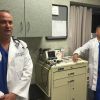How Cardiologists Help Manage Arrhythmias: A Comprehensive Guide to Treatment and Care
- 1. Understanding Arrhythmias: What They Are and Why They Matter
- 2. The Role of Cardiologists in Diagnosing Arrhythmias
- 3. Treatment Options for Arrhythmias: How Cardiologists Help
- 4. Personalized Care: Tailored Approaches to Managing Arrhythmias
- 5. Real-Life Cases: How Cardiologists Have Helped Patients Manage Arrhythmias
- 6. Final Thoughts: Taking Control of Arrhythmia Care
1. Understanding Arrhythmias: What They Are and Why They Matter
Arrhythmias refer to abnormal heart rhythms, which can either be too fast, too slow, or irregular. These disruptions can affect how efficiently the heart pumps blood throughout the body. While some arrhythmias are harmless, others can lead to severe complications, such as stroke or heart failure. Understanding arrhythmias is essential for recognizing symptoms early and seeking appropriate treatment.
2. The Role of Cardiologists in Diagnosing Arrhythmias
Cardiologists are specialists who focus on diagnosing and treating heart conditions, including arrhythmias. They use various diagnostic tools to pinpoint the specific type of arrhythmia a patient may have. These tools include:
- Electrocardiogram (ECG or EKG): A test that measures the electrical activity of the heart.
- Holter Monitor: A portable ECG device worn for 24-48 hours to capture heart rhythm over a period of time.
- Echocardiogram: An ultrasound of the heart that provides detailed images to detect structural issues.
- Event Monitor: A device used for longer monitoring periods to capture intermittent arrhythmias.
Once the cardiologist identifies the type of arrhythmia, they can formulate a tailored treatment plan to manage the condition effectively.
3. Treatment Options for Arrhythmias: How Cardiologists Help
There are multiple approaches to treating arrhythmias, and the choice of treatment largely depends on the type and severity of the arrhythmia. Cardiologists may recommend one or more of the following options:
- Medications: Anti-arrhythmic drugs, beta-blockers, and blood thinners are often used to control heart rhythm and prevent complications like blood clots.
- Ablation Therapy: A procedure where targeted areas of the heart tissue that cause arrhythmias are destroyed using radiofrequency energy.
- Pacing Devices: Pacemakers and implantable cardioverter-defibrillators (ICDs) can help regulate heart rhythm, especially in cases of severe arrhythmias.
- Cardioversion: A procedure to reset the heart's rhythm using electric shocks, especially for persistent arrhythmias.
Each treatment is carefully considered by cardiologists based on the patient's overall health and the nature of their arrhythmia.
4. Personalized Care: Tailored Approaches to Managing Arrhythmias
Arrhythmia management is not a one-size-fits-all approach. Cardiologists work closely with patients to develop a treatment plan that aligns with their unique needs. This includes regular follow-ups, adjusting treatment as needed, and providing lifestyle recommendations to minimize the risk of arrhythmias. For example, patients may be advised to reduce alcohol consumption, quit smoking, and manage stress to prevent triggers.
Personalized care also means that cardiologists help patients understand their condition, the potential risks, and the long-term management strategies for living with arrhythmias.
5. Real-Life Cases: How Cardiologists Have Helped Patients Manage Arrhythmias
Let’s take a look at two real-life stories of patients who benefitted from the expertise of cardiologists in managing arrhythmias:
Case 1: Sarah, a 56-year-old woman, suffered from atrial fibrillation (AFib), a common type of arrhythmia. After seeking the help of a cardiologist, she underwent catheter ablation, which significantly reduced her episodes of AFib. With personalized medication and lifestyle changes, Sarah regained control over her health.
Case 2: John, a 72-year-old man, was diagnosed with bradycardia, a condition where the heart beats too slowly. After being fitted with a pacemaker, John’s heart rhythm was normalized, and he was able to live a more active life without the fear of fainting or dizziness.
These cases highlight how cardiologists can make a profound difference in the lives of individuals living with arrhythmias.
6. Final Thoughts: Taking Control of Arrhythmia Care
If you or a loved one is dealing with arrhythmias, it's important to seek professional help from a cardiologist. Early diagnosis and a tailored treatment plan can improve quality of life and reduce the risks associated with heart rhythm disorders. Cardiologists not only provide medical treatment but also offer valuable support, guiding you through the management of your condition.
To explore the latest treatment options or schedule a consultation with a cardiologist, consider reaching out to a trusted healthcare provider today. Your heart health is in your hands, and with the right care, managing arrhythmias becomes a manageable part of your life.




















